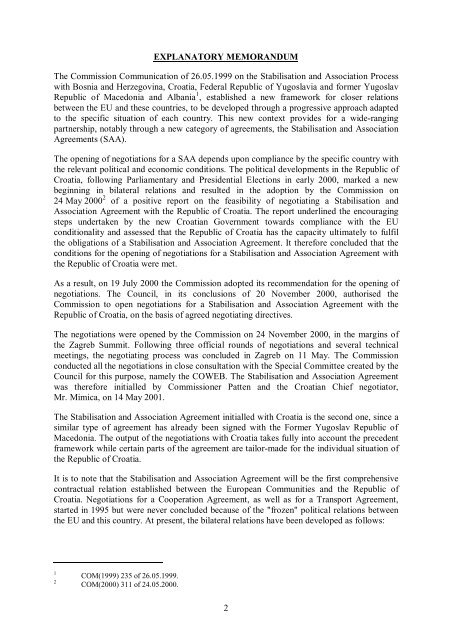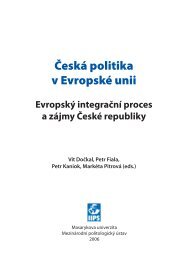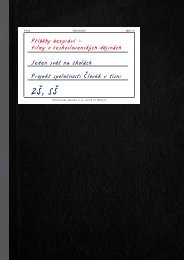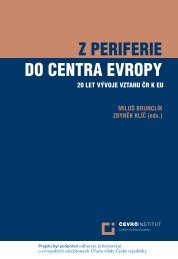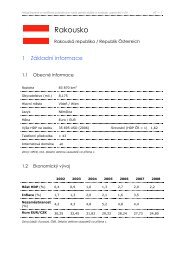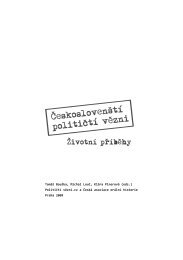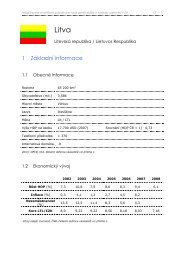Stabilisation and Association Agreement between the EU and Croatia
Stabilisation and Association Agreement between the EU and Croatia
Stabilisation and Association Agreement between the EU and Croatia
Create successful ePaper yourself
Turn your PDF publications into a flip-book with our unique Google optimized e-Paper software.
EXPLANATORY MEMORANDUM<br />
The Commission Communication of 26.05.1999 on <strong>the</strong> <strong>Stabilisation</strong> <strong>and</strong> <strong>Association</strong> Process<br />
with Bosnia <strong>and</strong> Herzegovina, <strong>Croatia</strong>, Federal Republic of Yugoslavia <strong>and</strong> former Yugoslav<br />
Republic of Macedonia <strong>and</strong> Albania 1 , established a new framework for closer relations<br />
<strong>between</strong> <strong>the</strong> <strong>EU</strong> <strong>and</strong> <strong>the</strong>se countries, to be developed through a progressive approach adapted<br />
to <strong>the</strong> specific situation of each country. This new context provides for a wide-ranging<br />
partnership, notably through a new category of agreements, <strong>the</strong> <strong>Stabilisation</strong> <strong>and</strong> <strong>Association</strong><br />
<strong>Agreement</strong>s (SAA).<br />
The opening of negotiations for a SAA depends upon compliance by <strong>the</strong> specific country with<br />
<strong>the</strong> relevant political <strong>and</strong> economic conditions. The political developments in <strong>the</strong> Republic of<br />
<strong>Croatia</strong>, following Parliamentary <strong>and</strong> Presidential Elections in early 2000, marked a new<br />
beginning in bilateral relations <strong>and</strong> resulted in <strong>the</strong> adoption by <strong>the</strong> Commission on<br />
24 May 2000 2 of a positive report on <strong>the</strong> feasibility of negotiating a <strong>Stabilisation</strong> <strong>and</strong><br />
<strong>Association</strong> <strong>Agreement</strong> with <strong>the</strong> Republic of <strong>Croatia</strong>. The report underlined <strong>the</strong> encouraging<br />
steps undertaken by <strong>the</strong> new <strong>Croatia</strong>n Government towards compliance with <strong>the</strong> <strong>EU</strong><br />
conditionality <strong>and</strong> assessed that <strong>the</strong> Republic of <strong>Croatia</strong> has <strong>the</strong> capacity ultimately to fulfil<br />
<strong>the</strong> obligations of a <strong>Stabilisation</strong> <strong>and</strong> <strong>Association</strong> <strong>Agreement</strong>. It <strong>the</strong>refore concluded that <strong>the</strong><br />
conditions for <strong>the</strong> opening of negotiations for a <strong>Stabilisation</strong> <strong>and</strong> <strong>Association</strong> <strong>Agreement</strong> with<br />
<strong>the</strong> Republic of <strong>Croatia</strong> were met.<br />
As a result, on 19 July 2000 <strong>the</strong> Commission adopted its recommendation for <strong>the</strong> opening of<br />
negotiations. The Council, in its conclusions of 20 November 2000, authorised <strong>the</strong><br />
Commission to open negotiations for a <strong>Stabilisation</strong> <strong>and</strong> <strong>Association</strong> <strong>Agreement</strong> with <strong>the</strong><br />
Republic of <strong>Croatia</strong>, on <strong>the</strong> basis of agreed negotiating directives.<br />
The negotiations were opened by <strong>the</strong> Commission on 24 November 2000, in <strong>the</strong> margins of<br />
<strong>the</strong> Zagreb Summit. Following three official rounds of negotiations <strong>and</strong> several technical<br />
meetings, <strong>the</strong> negotiating process was concluded in Zagreb on 11 May. The Commission<br />
conducted all <strong>the</strong> negotiations in close consultation with <strong>the</strong> Special Committee created by <strong>the</strong><br />
Council for this purpose, namely <strong>the</strong> COWEB. The <strong>Stabilisation</strong> <strong>and</strong> <strong>Association</strong> <strong>Agreement</strong><br />
was <strong>the</strong>refore initialled by Commissioner Patten <strong>and</strong> <strong>the</strong> <strong>Croatia</strong>n Chief negotiator,<br />
Mr. Mimica, on 14 May 2001.<br />
The <strong>Stabilisation</strong> <strong>and</strong> <strong>Association</strong> <strong>Agreement</strong> initialled with <strong>Croatia</strong> is <strong>the</strong> second one, since a<br />
similar type of agreement has already been signed with <strong>the</strong> Former Yugoslav Republic of<br />
Macedonia. The output of <strong>the</strong> negotiations with <strong>Croatia</strong> takes fully into account <strong>the</strong> precedent<br />
framework while certain parts of <strong>the</strong> agreement are tailor-made for <strong>the</strong> individual situation of<br />
<strong>the</strong> Republic of <strong>Croatia</strong>.<br />
It is to note that <strong>the</strong> <strong>Stabilisation</strong> <strong>and</strong> <strong>Association</strong> <strong>Agreement</strong> will be <strong>the</strong> first comprehensive<br />
contractual relation established <strong>between</strong> <strong>the</strong> European Communities <strong>and</strong> <strong>the</strong> Republic of<br />
<strong>Croatia</strong>. Negotiations for a Cooperation <strong>Agreement</strong>, as well as for a Transport <strong>Agreement</strong>,<br />
started in 1995 but were never concluded because of <strong>the</strong> "frozen" political relations <strong>between</strong><br />
<strong>the</strong> <strong>EU</strong> <strong>and</strong> this country. At present, <strong>the</strong> bilateral relations have been developed as follows:<br />
1<br />
2<br />
COM(1999) 235 of 26.05.1999.<br />
COM(2000) 311 of 24.05.2000.<br />
2


